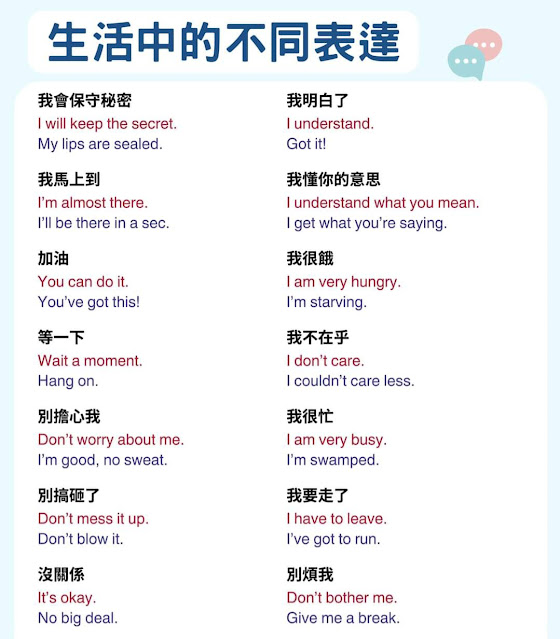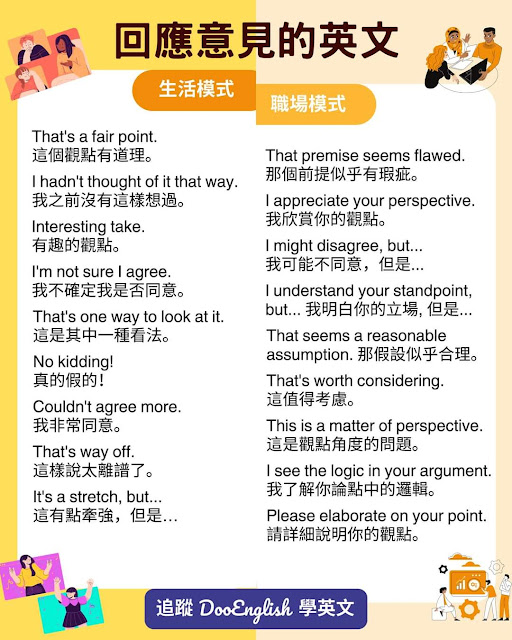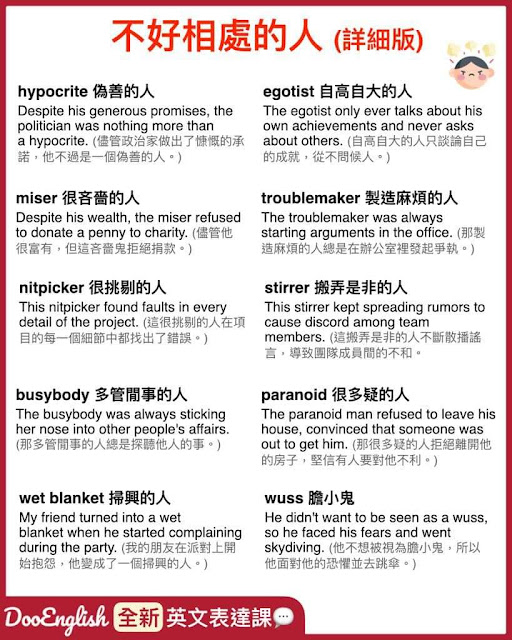正面
人際互動
Fantasize 幻想:
She likes to fantasize about being a successful businesswoman someday. (她喜歡幻想有一天成為成功的女商人。)
.
Visualize 形象化:
We should visualize our goals to motivate ourselves daily. (我們應該將我們的目標形象化,以每日激勵自己。)
.
Realize 意識到:
He didn't realize the impact of his words on others. (他並未意識到他的話對他人的影響。)
.
Misinterpret 誤解:
His words were misinterpreted, causing unnecessary confusion in the team. (他的話被誤解,導致團隊中產生不必要的混淆。)
.
Liaise 聯繫:
She will liaise with clients to understand their requirements better. (她將與客戶聯繫以更好地了解他們的需求。)
.
Compromise 妥協:
We had to compromise to reach an agreement quickly. (我們必須妥協以快速達成協議。)
.
Assume 假定:
Let's not assume anything without proper evidence and investigation. (在沒有適當的證據和調查之前,我們不要假定任何事情。)
.
Contemplate 盤算:
I need to contemplate before making such a big decision. (我需要在做出如此重大的決定之前深思熟慮。)
.
Acknowledge 承認:
We should acknowledge our mistakes and learn from them. (我們應該承認我們的錯誤並從中學習。)
.
Hesitate 猶豫:
He did not hesitate to voice his disagreement openly. (他毫不猶豫地公開表達他的異議。)
.
Differ 與...有分歧:
They differ in opinions but respect each other's perspectives. (他們在觀點上有分歧,但尊重彼此的觀點。)
.
Imply 暗示:
His words seemed to imply dissatisfaction with the results. (他的話似乎暗示對結果的不滿。)
Infer 推斷:
From her tone, we inferred she was upset. (從她的語調,我們推斷她很懊惱。)
.
Causation 因果關係:
The causation between communication and performance is crucial. (溝通與表現之間的因果關係至關重要。)
.
Connotation 隱含意義:
His words had a positive connotation beyond literal meaning. (他的話超出字面意義有積極的隱含意義。)
.
Convey 傳達:
We must convey ideas clearly to avoid misunderstanding. (我們必須清楚地傳達想法以避免誤解。)
.
Negotiate 談判:
Skillful negotiation is necessary for a fair deal. (巧妙的談判對於公平交易是必要的。)
.
Include 包含:
The agenda should include all important discussion points. (議程應包含所有重要的討論點。)
.
Premise 前提:
Mutual respect is the premise for constructive conversation. (相互尊重是建設性對話的前提。)
.
Holistic 全面的:
A holistic approach is necessary for complex communication. (對於複雜的溝通,全面的方法是必要的。)
.
Hypothesize 假定:
We hypothesize that clear communication boosts overall team morale. (我們假定,清晰的溝通可以提升整個團隊的士氣。)
.
Induce 導致:
Poor communication can induce team conflicts. (糟糕的溝通可以引起團隊衝突。)
.
Stimulate 激發:
Good leaders stimulate open communication for positivity. (好的領導者激發開放的溝通以產生積極性。)
.
Exclude 不包含:
Don't exclude anyone's opinion in team decisions. (在團隊決策中,不要排除任何人的意見。)
Sophistry 詭辯:
His sophistry during the meeting left the team totally confused. (他在會議中的詭辯讓團隊完全困惑。)
.
Absurd 荒謬:
His absurd argument did not contribute to the productive discussion. (他荒謬的論點並未對生產性討論作出貢獻。)
.
Empower 授權:
Empower your team members to express their opinions freely. (授權你的團隊成員自由表達他們的意見。)
.
Verbal 口頭的:
Good verbal communication skills are essential for team collaboration. (良好的口頭溝通技巧對於團隊協作至關重要。)
.
Barrier 障礙:
Language can often become a barrier in effective communication. (語言常常成為有效溝通的障礙。)
.
Face-to-face 面對面:
Face-to-face communication can often resolve misunderstandings quickly. (面對面的溝通常常可以快速解決誤解。)
.
Confuse 搞混亂:
Confusing messages can lead to misunderstanding among team members. (混亂的訊息可能導致團隊成員之間的誤解。)
.
Coordinate 協調:
It's important to coordinate well for effective team communication. (良好的協調對於有效的團隊溝通非常重要。)
.
Collaborate 協作:
We should collaborate to ensure clear and open communication. (我們應該協作以確保清晰開放的溝通。)
.
Distract 干擾:
Unnecessary noise can distract from effective communication. (不必要的噪音可能會干擾有效的溝通。)
.
Highlight 強調:
It's crucial to highlight main points in any communication. (在任何溝通中強調主要點是至關重要的。)
.
Posture 姿勢:
Your posture can greatly affect your non-verbal communication. (你的姿勢可能會大大影響你的非語言溝通。)
負面

負面的情緒
Apprehensive (擔憂):
He was apprehensive about the results of his medical tests. (他對他的醫學測試結果感到擔憂。)
.
Serene (寧靜):
She felt serene after a long walk in the park. (在公園裡長時間散步後,她感到寧靜。)
.
Melancholy (憂鬱):
The gloomy weather made him feel melancholy. (陰沉的天氣使他感到憂鬱。)
.
Desolate (孤寂):
After his dog passed away, he felt incredibly desolate. (他的狗過世後,他感到極度孤寂。)
.
Depressed (沮喪):
Losing her job made her feel depressed. (失去工作使她感到沮喪。)
.
Distraught (心煩意亂):
The news of his friend's accident left him distraught. (他朋友的意外消息讓他心煩意亂。)
.
Stressed (壓力大):
The upcoming exams made her feel very stressed. (即將到來的考試使她感到非常壓力大。)
.
Nervous (緊張):
He was nervous before his job interview. (他在面試前感到緊張。)
.
Agitated (不安):
The constant noise from the construction site made her feel agitated. (來自工地的持續噪音使她感到不安。)
.
Fearful (害怕):
The thought of speaking in public made him feel fearful. (公開演講的念頭使他感到害怕。)
.
Worried (擔心):
She was worried about her mother's health. (她擔心她母親的健康。)
.
Annoyed (惱人):
He was annoyed by the constant interruptions. (他被不斷的中斷所惱怒。)
.
Frustrated (感挫折):
She was frustrated by the lack of progress in her project. (她對她的項目進展緩慢感到挫折。)
.
Furious (憤怒):
She was furious when she found out about the betrayal. (當她發現被背叛時,她憤怒了。)
.
Disappointed (失望):
He was disappointed by the low turnout at the event. (他對活動的低參與度感到失望。)
.
Disgruntled (不滿):
The employees were disgruntled about the lack of benefits. (員工對缺乏福利感到不滿。)
.
Pessimistic (悲觀):
The constant setbacks made him feel pessimistic about the project's success. (不斷的挫折使他對項目的成功感到悲觀。)
.
Hostile (敵意):
She felt hostile towards her colleague after the argument. (與同事爭論後,她對同事感到敵意。)
.
Insecure (不安):
He felt insecure about his skills when compared to his classmates. (與同學相比,他對自己的技能感到不安。)
.
Cynical (憤世嫉俗):
After several failed relationships, he started to feel cynical about love. (經歷了幾次失敗的戀愛後,他對愛開始感到憤世嫉俗。)
.
Helpless (無助):
When his car broke down in the middle of nowhere, he felt helpless. (當他的車在無人之地壞了時,他感到無助。)
.
Regretful (後悔):
She felt regretful after missing the opportunity to meet her favorite author. (錯過了見到她最喜歡的作者的機會後,她感到後悔。)
.
Offended (被冒犯):
He felt offended by his friend's harsh words. (他被朋友的刻薄話語冒犯了。)
.
Jealous (嫉妒):
She felt jealous when her best friend got the promotion she had been hoping for. (當她最好的朋友得到了她一直希望得到的晉升時,她感到嫉妒。)
.
Ashamed (感到羞恥):
He felt ashamed after realizing he had forgotten his wife's birthday. (他意識到他忘記了他妻子的生日後感到羞恥。)
.
Resigned (無可奈何):
After several attempts to fix the situation, he felt resigned to his fate. (在多次嘗試解決問題後,他對自己的命運感到無可奈何。)
.
Inferior (自卑):
She felt inferior when her peers outperformed her in the competition. (當她的同儕在比賽中表現出色時,她感到自卑。)
.
Embarrassed (尷尬):
He felt embarrassed after tripping on stage during the presentation. (在演講期間在舞台上絆倒後,他感到尷尬。)
.
Anguished (痛苦):
The loss of her beloved pet left her feeling anguished. (失去她心愛的寵物使她感到痛苦。)
.
Lethargic (無精打采):
After a long week of work, she felt lethargic and uninterested in any activities. (在經過一個長時間的工作周後,她感到無精打采,對任何活動都不感興趣。)





































































































